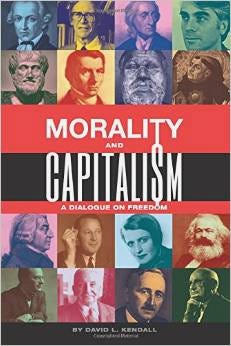Morality and Capitalism
Do you recognize the faces on the cover of my little book?
This essay is shameless promotion of my little book, Morality and Capitalism: A Dialogue on Freedom. I invite one and all to click the link and give it a read. 😊
If morality is respect for and self-willed obedience to The Moral Imperative — do not compel another unjustly, and if capitalism is a social system of political economy that consistently requires private property, voluntary exchange, freedom, and just law, the four pillars of true capitalism, then capitalism is moral; moreover, capitalism is the only system of political economy that has the potential to be moral. A straightforward syllogism makes the case:
Major Premise: Compelling people unjustly is immoral.
Minor Premise: Capitalism does not compel people unjustly.
Conclusion: Capitalism is moral.
Any system of political economy that includes or allows unjust compulsion of one by another — or compulsion of one set of people (members of society) by another set of people (government operatives) — is immoral, by the same logic.
Socialism, communism, democratic socialism, fascism, monarchy, and every other system of political economy aside from capitalism, not only allow, but require for their very existence, unjust compulsion of one by another. Consequently, not only is true capitalism moral, it is the only system of political economy that is moral.
Sadly enough, we have never seen on planet earth a society that practiced true capitalism. Who knows if we ever shall. We are not likely to achieve such a magnificent society, unless the people who comprise it are both moral and virtuous. The meaning of morality presented in Morality and Capitalism focuses our attention on the principle of not compelling others unjustly. But we should never lose sight of the very powerful idea of virtue, for without virtuous people, we are entirely unlikely to ever achieve true capitalism.





